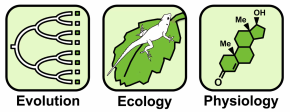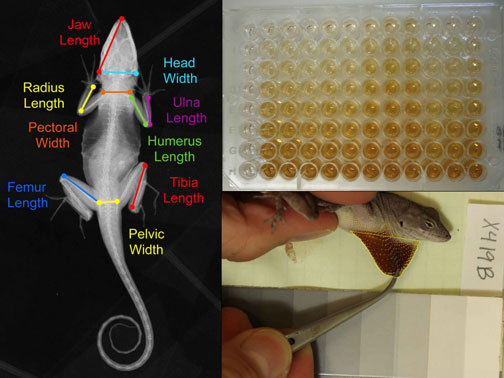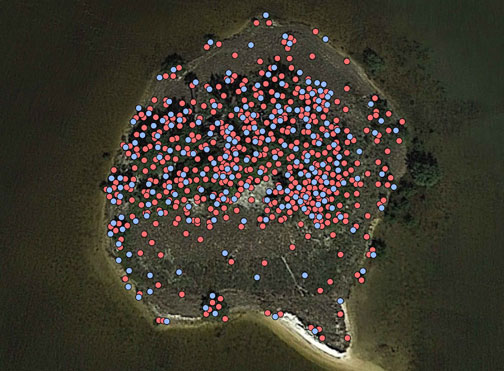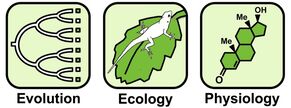Quantitative genetics
Many of our current approaches to studying sexual conflict and sexual dimorphism involve quantitative genetics - a set of techniques for measuring the extent to which traits are heritable and genetically correlated with other traits. Our current work does this in two ways: (1) using a large breeding colony, which allows us to measure heritability and genetic correlations for traits such as skeletal morphology, plasma testosterone, and dewlap size or color (left image), and (2) using mark-recapture and genetic parentage assignment in wild populations, which allows us to determine whether fitness is negatively genetically correlated between the sexes (our study island is shown on the right).
Relevant Publications
Wittman, T.N., C.D. Robinson, J.W. McGlothlin and R.M. Cox. 2021. Hormonal pleiotropy structures genetic covariance. Evolution Letters. Evolution Letters blog post.
Cox, R.M. 2020. Sex steroids as mediators of phenotypic integration, genetic correlations, and evolutionary transitions. Molecular and Cellular Endocrinology 502: 110668
McGlothlin, J.W., R.M. Cox, and E.D. Brodie III. 2019. Sex-specific selection and the evolution of between-sex genetic covariance. Journal of Heredity 110: 422-432.
Logan, M.L., J.D. Curlis, A.L. Gilbert, D.B. Miles, A.K. Chung, J.W. McGlothlin, and R.M. Cox. 2018. Thermal physiology and thermoregulatory behaviour exhibit low heritability despite genetic divergence between lizard populations. Proceedings of the Royal Society B 285: 20180697.
Cox, R.M., R.A. Costello, B. Camber, and J.W. McGlothlin. 2017. Multivariate genetic architecture of the Anolis dewlap reveals both shared and sex-specific features of a sexually dimorphic ornament. Journal of Evolutionary Biology 30: 1262-1275.
Cox, R.M., C.L. Cox, J.W. McGlothlin, D. Card, A. Andrew, and T.A. Castoe. 2017. Hormonally mediated increases in sex-biased gene expression accompany the breakdown of between-sex genetic correlations in a sexually dimorphic lizard. The American Naturalist 189: 315-332.
Cox, R.M., J.W. McGlothlin and F. Bonier. 2016. Homones as mediators of phenotypic and genetic integration: An evolutionary genetics approach. Integrative & Comparative Biology 56: 126-137.
Wittman, T.N., C.D. Robinson, J.W. McGlothlin and R.M. Cox. 2021. Hormonal pleiotropy structures genetic covariance. Evolution Letters. Evolution Letters blog post.
Cox, R.M. 2020. Sex steroids as mediators of phenotypic integration, genetic correlations, and evolutionary transitions. Molecular and Cellular Endocrinology 502: 110668
McGlothlin, J.W., R.M. Cox, and E.D. Brodie III. 2019. Sex-specific selection and the evolution of between-sex genetic covariance. Journal of Heredity 110: 422-432.
Logan, M.L., J.D. Curlis, A.L. Gilbert, D.B. Miles, A.K. Chung, J.W. McGlothlin, and R.M. Cox. 2018. Thermal physiology and thermoregulatory behaviour exhibit low heritability despite genetic divergence between lizard populations. Proceedings of the Royal Society B 285: 20180697.
Cox, R.M., R.A. Costello, B. Camber, and J.W. McGlothlin. 2017. Multivariate genetic architecture of the Anolis dewlap reveals both shared and sex-specific features of a sexually dimorphic ornament. Journal of Evolutionary Biology 30: 1262-1275.
Cox, R.M., C.L. Cox, J.W. McGlothlin, D. Card, A. Andrew, and T.A. Castoe. 2017. Hormonally mediated increases in sex-biased gene expression accompany the breakdown of between-sex genetic correlations in a sexually dimorphic lizard. The American Naturalist 189: 315-332.
Cox, R.M., J.W. McGlothlin and F. Bonier. 2016. Homones as mediators of phenotypic and genetic integration: An evolutionary genetics approach. Integrative & Comparative Biology 56: 126-137.



